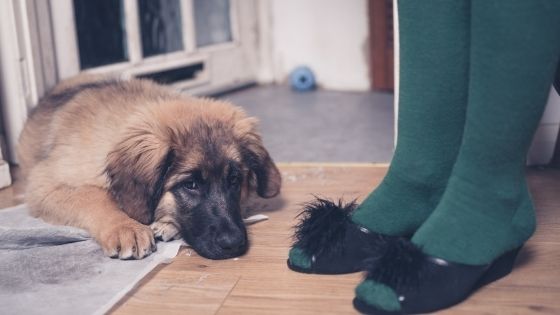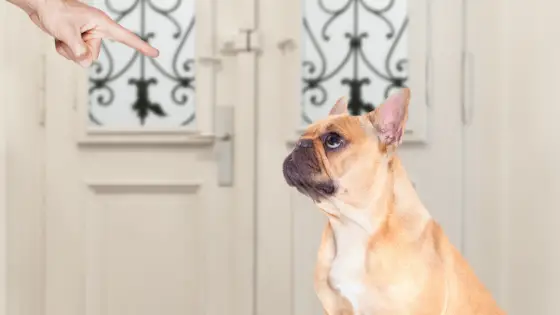Coprophagia or eating feces is done by many animals, not just pups. In fact, a dog that has just given birth will eat their puppies feces during the first three weeks of nursing.
In all actuality, the practice is more disturbing for pet owners than it is harmful to the dog.
However, there is one factor that can change all of that and that is if your dog eats feces infected with worms. Tapeworms, roundworms, and whipworms are fairly common among puppies and if your pet baby gets a hold of poop with either of these eggs they have unknowingly infected themselves. These worms are zoonotic, which means they can also pass to humans if proper cleanliness isn’t observed.
There are also a plethora of other parasites and diseases, like parvo, that can also be transmitted from your pup eating feces from other dogs.
Some dogs are not finicky poop eaters and will chow down on pretty much any type of excrement including deer, coyote, and rabbit. Because these animals are wild they don’t get the proper treatments like deworming and vaccinations that many domesticated pets do, which leaves your pup vulnerable to another set of possible diseases and parasitic infections.
One other large downfall of coprophagy is the halitosis that often comes along with it.

Why do dogs eat their poop?
While the reason is going to be specific to your dog, here are a couple of common reasons why dogs eat their feces
- Lack of minerals & vitamins: This is often seen in older dogs
- Fear of punishment: If punished too severely for soiling their kennels or the floor, some pups will resort to eating their poop to get rid of the evidence
- Habitual: Some pups have noticed their mother cleaning up their poop and copied her and in some cases, the dog has been doing it so long that it has become a habit, which is why you want to break them of this early on.
- Anxiety: Anxiety and boredom can sometimes bring on coprophagy\

How do I stop coprophagy?
1. Use a leash
If your pup is eating other dogs’ feces, the best way to prevent it is to walk them on a leash at all times. This way you can keep him or her away from other dogs’ poop that may be lingering on the ground.
2. Feed a high quality dog food
If your dog is eating their poop for the nutrients this should help put a stop to the coprophagy.
3. Get a walk in litter box
If your pup is eating your cat’s poop, many owners have had success in eliminating the problem by getting a litter box that the dog can not fit into like the one pictured below.
4. Make the poop taste gross
If your pup is eating their own poop, one thing you can do is to make it taste gross to them. I know, I know, you’re asking yourself how in the world does poop taste good? Well, that I don’t have an answer for, but I do have a couple of suggestions on how you can make it less appealing to your pup.
- If you are comfortable leaving the poop available for the pup to sniff and taste you can try coating it in hot sauce, pepper, or lemon juice so that the dog will associate that taste with his poop. This method is usually a last resort for most pet owners as they don’t want to leave the waste sitting out.
- Add a small amount of pumpkin, pineapple, or meat tenderizer to your dog’s food. The theory is that once they digest and poop it out the dog won’t want to eat it because it tastes disgusting to them.
- Use an over the counter stool eating deterrent
5. Clean up after them immediately
This way your pup won’t have the opportunity to eat the poop.
6. Increase the fiber content
In some cases, owners have noticed improvement when they increased their dog’s fiber content. However, you want to consult your veterinarian prior to doing so because too much fiber will decrease your pup’s caloric intake and have some adverse effects.
7. Avoid feeding table food
Feeding table food may make the feces tastier to your dog, which is the opposite of what you want to achieve.
8. Use a collar
An article published by the British Veterinary Association did a study between two effective treatments for coprophagy and noted that the use of a citronella spray collar seemed to help the most and cause the least harm. You can read more here.
What not to do
Don’t punish your pup. This may only serve to violate the confidence in the bond you are forming with your puppy and it may actually have the opposite effect and make it worse.
Don’t ignore the issue hoping it will just go away with age, there is a chance that it will but there is always a chance that it won’t!



























































































































The research showed that several key factors appear to have no effect on whether your dog is a poo-eater. These included age, gender, whether the dog has been spayed or neutered, whether it was housetrained, whether it had been weaned or removed from its mother early, and what the rest of its diet was like. Evidence also suggests that the plethora of products designed to prevent or treat coprophagy, or punishing your dog for eating poo, have no effect on reducing the behaviour. Instead, the recent study suggests the best way to predict whether a dog eats faeces is how much access to poo they have. This is particularly the case if the faeces are fresh, with over 80% of coprophagic dogs only consuming poo less than two days old. It seems that keeping your dog away from fresh poo is the most effective strategy for stopping them eating it. This is yet another reason to promote regular poo picking and responsible dog ownership, both at home and out walking.